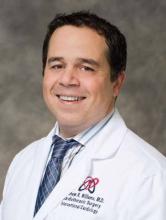Informal discussions between cardiologists and surgeons about revascularization cases have, of course, gone on for years, and most seem comfortable with it staying that way.
"In community hospitals, patients without complex CAD [coronary artery disease] do not routinely have cardiac surgery consultations. The traditional model is that when a patient needs surgery, the cardiologist consults a surgeon," said Dr. David C. May, an interventional cardiologist in Coppell, Tex.
"Ad hoc or provisional stenting remains the norm in about half the cases. It’s important to separate the complex and simple cases. Most ad hoc PCI is not done in complex cases. Complex cases are done as scheduled, planned procedures," Dr. May said in an interview.
"In the real world, cardiologists see surgeons all the time, every day. We interact all the time. Collegial discussions about patients are always on the table. Most of these consultations are off the cuff and not official," agreed Dr. Peter C. Block, an interventional cardiologist at Emory University in Atlanta.
"If a patient is clearly a PCI candidate, with a SYNTAX score of 15 and no diabetes, I will do PCI" without a surgical consult. "If the patient has a SYNTAX score of 28 or 30 and I think he is not a good patient for PCI, I’ll discuss it with my surgical colleagues. If we agree, I’ll either do the PCI or pass off the patient for surgery. It would be very difficult to get a surgical consult for every U.S. patient who gets PCI," Dr. Block said.
Waiting for "the pause"
But is this approach to heart team use consistent with existing guidelines, and do cardiologists usually make the right call on when they should seek a surgical consult? A critical part is what some people call "the pause," or "taking a patient off the table." An interventional cardiologist can either perform a coronary catheterization for diagnostic purposes only, obtain the patient’s coronary angiogram, and then halt the catheterization procedure while the angiogram films are reviewed by the cardiologist and surgeon, or the cardiologist can elect to continue on after angiography and proceed directly to PCI.
"Many cardiologists don’t believe a pause is necessary. If you ask most U.S. cardiologists, they will tell you that they are comfortable making the decision to stent on their own, that they don’t need a surgeon engaged in the conversation," said heart surgeon Timothy J. Gardner, medical director of the center for heart and vascular health at Christiana Care Health System in Wilmington, Del. "They don’t want to delay the stenting to another catheterization if they believe that patient needs PCI."
But at least one cardiac surgeon believes that postangiogram pauses are on the rise.
"We are definitely seeing a pause after angiography a lot more," said Dr. Mathew R. Williams, a cardiac surgeon and interventional cardiologist and codirector of the heart valve center at Columbia University in New York. "Rather than doing PCI at the time of diagnostic cath, patients are coming off the table, even when we feel the patient should have PCI. Not every case, but patients are coming off the table and that discussion is occurring for patients with complex disease, with left main and LAD [left anterior descending] involvement," Dr. Williams said.
Paying for the consult
Reimbursement is another potential challenge to the viability of surgical consults for revascularization patients.
"It’s a challenge to get people in a busy community practice together as a heart team. They are their own business entity. How do you create a heart team across these business entities?" asked Dr. Thoralf M. Sundt III, chief of cardiac surgery at Massachusetts General Hospital in Boston. "My view of community practice is limited, but I think it’s a real challenge for most community practices to do it. People agree with the heart team concept in theory, but executing it in communities will be a huge challenge."
Dr. Nallamothu of the University of Michigan said, "I’m at an academic center, and for the most part we are salaried. A lot of the heart team discussions are built into our academic responsibilities. For heart teams to really take off in the community, we need to understand how we are going to do it. You need a mechanism to value the work of evaluating cases and rendering opinions about treatment. You can’t expect physicians to do that pro bono. I think it will be a disincentive for full engagement and cooperation unless you can figure out" how to compensate physicians for just rendering their opinions.


